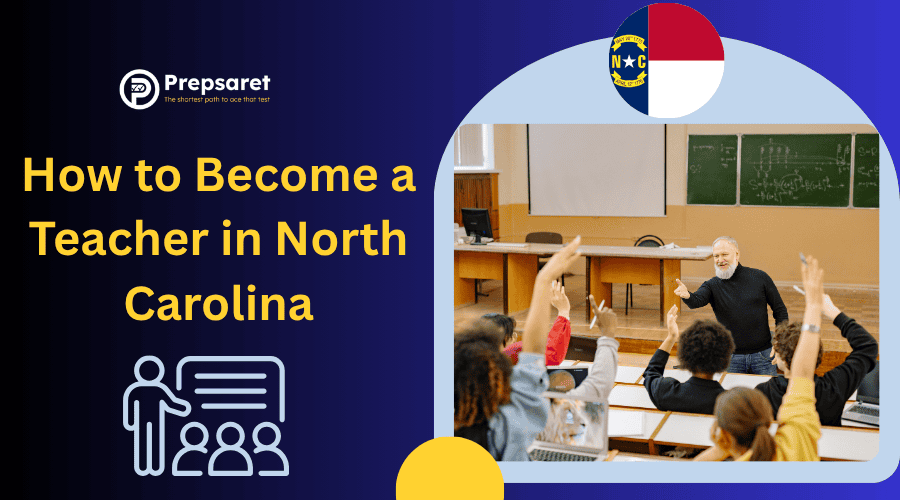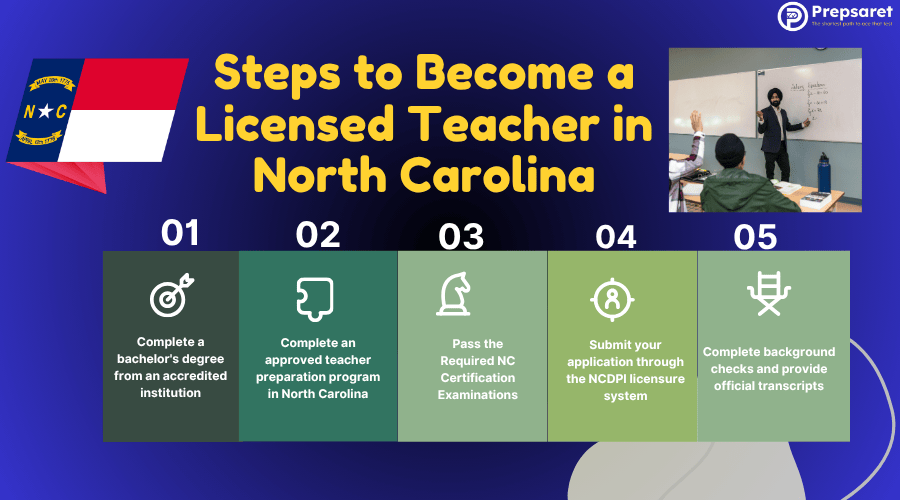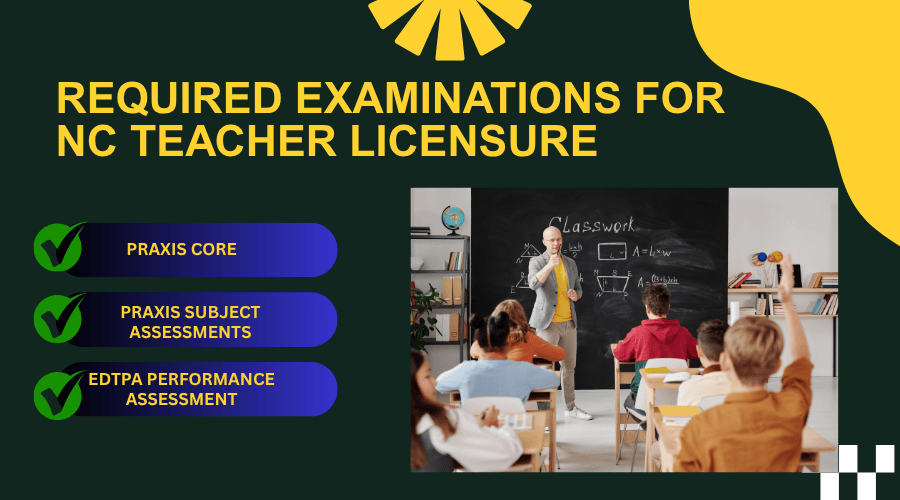Choosing to teach is one of the most meaningful career decisions you can make. North Carolina offers clear pathways, strong benefits, and growing demand for qualified educators. The North Carolina Department of Public Instruction (NCDPI) oversees all licensing, ensuring teachers meet high standards.
This guide explains everything about how to become a teacher in North Carolina, from degrees to exams, while Prepsaret support your success on essential certification tests.
Steps to Become a Licensed Teacher in North Carolina
Understanding the steps to become a licensed teacher in North Carolina helps you plan your journey with confidence. While details vary by background and pathway, the general NC teacher licensure process includes the following:
- Complete an approved educator preparation program through a college, university, or alternative pathway
- Earn a bachelor’s degree (minimum requirement for initial licensure)
- Pass required examinations, including Praxis Subject Assessments and edTPA performance assessment
- Submit your application through the NCDPI licensure system
- Complete background checks and provide official transcripts
- Receive your initial teaching license to begin your career
The North Carolina teacher requirements ensure that all educators demonstrate both subject expertise and classroom readiness. The teaching certification in North Carolina system supports multiple entry routes while maintaining consistent standards. Depending on your starting point, the process can take one to four years.
Check Out: Praxis Score Release Dates
Education Pathways for North Carolina Teachers
Aspiring teachers can pursue several education pathways, each designed to meet North Carolina teacher certification requirements and prepare candidates for success.
Traditional University Programs for Teacher Preparation in NC
The most common route involves earning a bachelor’s degree in education North Carolina from an accredited institution. These programs combine general studies, subject concentration, and supervised clinical experiences.
Universities such as UNC Chapel Hill, NC State, and East Carolina University offer approved teacher preparation programs in NC leading to initial licensure.
Educator Preparation Programs (EPPs)
All approved educator preparation programs (EPPs) NC share common elements regardless of institution:
- Content mastery in your chosen subject area or grade level
- Educational foundations covering learning theory, child development, and classroom management
- Pedagogical methods specific to your teaching field
- Clinical practice with progressively increasing responsibility
- Assessment and reflection components to develop professional practice
Some programs integrate teacher preparation throughout a four-year degree, while others offer post-baccalaureate options for those who already hold degrees in other fields.
What Degree Do You Need to Teach in North Carolina?
This depends on your grade level and subject area:
- Elementary teachers: Elementary education degree or content degree with certification coursework
- Middle/high school teachers: Major in subject area with education requirements and student teaching
- Special education teachers: Specialized degrees focusing on diverse learners
- Career/technical teachers: May require industry experience in addition to coursework
At minimum, all initial licenses require a bachelor’s degree from an accredited institution regardless of the specific pathway you choose.
Check this out: Best Praxis study resources
Alternative Routes to Teaching in NC
Not every educator follows the traditional path, which is why North Carolina offers alternative pathways to becoming a teacher in North Carolina. These routes serve career changers and professionals with strong subject expertise.
Programs for alternative teacher certification NC allow individuals with non-education bachelor’s degrees to earn a license. These programs combine accelerated coursework with supervised classroom teaching.
Can You Teach in NC Without a Teaching Degree?
Yes. Through approved alternative routes. However, you still need a bachelor’s degree in some field, and you must complete all certification requirements including exams and supervised teaching experiences.
Teaching in NC Without a Traditional Education Degree
For candidates wondering how to become a teacher in North Carolina without a teaching degree, several options exist including:
- Residency-based programs that place you in classrooms with mentor support while you complete coursework
- University-based alternative programs designed for career changers
- Regional alternative licensure centers operated by school districts or RESA organizations
- Teach For America and similar national programs with NC partnerships
Provisional Licenses and Licensure-Only Programs in NC
A provisional teaching license NC allows candidates to begin teaching while completing requirements in high-need areas. Licensure only programs NC are designed for individuals with strong content knowledge but no formal pedagogy training, focusing on teaching skills and classroom management.
Note: Even when pursuing how to become a teacher in North Carolina without the traditional degree route, candidates must meet the same high standards, completing coursework, passing exams, and demonstrating classroom effectiveness.
How to Become a Teacher in North Carolina Online
For those balancing work, family, or geographic constraints, exploring how to become a teacher in North Carolina online opens new possibilities. Many universities and alternative programs now offer partial or fully online educator preparation experiences.
Benefits of Online Teacher Preparation Programs in NC
Online programs provide flexibility in several ways:
- Asynchronous coursework you complete on your own schedule
- Virtual class sessions replacing some in-person meetings
- Hybrid models combining online learning with in-person clinical experiences
- Accelerated formats allowing faster completion
Even with online coursework, North Carolina licensure still requires in-classroom experience. Student teaching or residency placements are completed in schools near your community to meet state standards.
When choosing an online pathway, always confirm that the program is NCDPI-approved and leads to full licensure eligibility. This ensures quality training and prepares you for classroom success.
Exams and Application Process for NC Teacher Certification
Understanding the exams, application steps, timelines, and expenses is essential for earning your license. Below are the key requirements for North Carolina teachers.
Required Examinations for NC Licensure
Passing Praxis exams North Carolina is a core licensure step. Depending on grade level and subject, you may need:
- Praxis Core (Reading, Writing, Mathematics) – exemptions available for high SAT/ACT scores or certain degrees
- Praxis Subject Assessments – measuring subject-area knowledge
- edTPA performance assessment – evaluating actual teaching effectiveness
Prepsaret offers realistic practice tests, explanations, and study tools to help you prepare with confidence.
Read More: Free Praxis Practice Test: Praxis Core Questions and Answers
How to Apply for Teacher Certification in NC
The NC teaching license application process occurs through the NCDPI Licensure system. You’ll need to:
- Create an account on the NCDPI website
- Complete the online application form
- Submit official transcripts from all institutions attended
- Provide program completion verification from your EPP
- Upload passing test scores
- Complete background check authorization
- Pay application fees
Starting early allows sufficient time for document processing. Official transcripts, background checks, and program verifications can take several weeks to arrive.
How Long Does it Take to Get a Teaching License in NC
Those completing traditional four-year programs earn licenses upon graduation and program completion, typically four years from start to finish. Alternative route candidates may receive provisional licenses within months but need one to three years to complete full licensure requirements.
Cost of Teacher Certification in North Carolina
This include:
- Program tuition ranging from a few thousand dollars (for some alternative routes) to typical university costs (for traditional degrees)
- Exam fees totaling $300-500 depending on required tests
- Application fees around $65 for initial licensure
- Background check costs approximately $75
Financial aid, scholarships, and loan forgiveness programs can offset these expenses.
How to Manage and Maintain NC Teaching License
Once you earn your North Carolina teaching license, you’ll manage it through the NCDPI online licensure system. Staying on top of your license status, renewal, and updates ensures you remain eligible to teach.
How to Access Your License Information
Use the NC teaching license lookup to verify your license status, expiration date, and endorsements. With your NC teaching license login, you can:
- Update personal information
- Track renewal requirements
- Add new licensure areas
- View your complete licensure history
- Download license copies
Keep your contact information current so you receive important notifications about renewal deadlines and policy changes.
License Renewal Requirements in NC
Your NC teaching license renewal occurs every five years. To maintain active status, you must complete continuing education demonstrating professional growth, such as:
- Graduate coursework
- Professional development workshops
- National Board Certification pursuit
- Educational conferences
- Action research projects
School district professional development offices can help with documentation. Start tracking activities early to avoid renewal stress.
How to Transfer Out-of-State Teaching License to North Carolina
Through reciprocity, NCDPI reviews your existing license to see how it aligns with NC standards. Typically, you must:
- Hold a valid license from another state
- Meet NC’s testing requirements (which may differ from your current state)
- Complete a NC-specific application
- Provide verification of your out-of-state license
- Pass background checks
Some requirements may be waived through reciprocity agreements with your state, while others require additional documentation or testing.
Related post: State by State Praxis requirements
Teaching in North Carolina: Career Outlook
North Carolina offers strong career opportunities for teachers, especially in high-demand fields. From competitive salaries to advancement pathways, teaching in the Tar Heel State combines professional growth with meaningful impact.
Qualifications Needed for North Carolina Teachers
Understanding NC public school teacher qualifications helps you gauge whether the profession aligns with your strengths. Beyond formal credentials, effective teachers in North Carolina demonstrate:
- Strong communication and interpersonal skills
- Cultural competence and commitment to equity
- Patience and adaptability
- Organization and planning abilities
- Passion for content and student growth
The state actively recruits teachers in high-need areas including mathematics, science, special education, and English as a Second Language. Urban and rural districts often offer incentives for teachers willing to work in challenging environments.
North Carolina Teacher Salary and Benefits
North Carolina teaching salary and benefits are competitive compared to regional averages. Starting salaries for first-year teachers with a bachelor’s degree range from $37,000–$40,000, with increases tied to experience and advanced credentials.
Benefits of North Carolina Teachers
- Health insurance options through the state employees’ system
- Retirement plans through the Teachers’ and State Employees’ Retirement System
- Professional development funding and opportunities
- Job security through continuing contract status
- Summer break and holiday schedules
Teachers with National Board Certification earn substantial salary supplements. Graduate degrees and specialized endorsements also increase earning potential throughout your career.
Professional Growth and Advancement Opportunities in NC Education
Teaching in North Carolina provides advancement beyond the classroom. Experienced educators may pursue roles in:
- Instructional coaching supporting other teachers
- Curriculum development roles at district or state level
- School administration as assistant principals and principals
- Department chairperson positions in secondary schools
- Higher education teaching in university education programs
Whether through traditional, alternative, or online pathways, North Carolina offers a rewarding career with diverse opportunities for impact and growth.
How to Become a Teacher in North Carolina: FAQs
What Is the Quickest Program to Become a Teacher?
Alternative certification is the fastest route. Residency-based programs let bachelor’s degree holders start teaching within months while completing licensure requirements over 1–2 years.
How Much Does a 1st Year Teacher Make in NC?
First-year teachers in North Carolina typically earn $37,000–$40,000 annually with a bachelor’s degree, with salaries rising through experience, advanced credentials, and National Board Certification.
Is There a 2 Year Teaching Degree?
No. North Carolina requires a bachelor’s for licensure. Associate degrees transfer to four-year programs, while post-baccalaureate alternatives allow licensed teaching within 1–2 years.
What Is the Pay Scale for Teachers in NC?
NC salaries increase with experience and education. Bachelor’s teachers reach about $54,000 after 25 years; master’s add $2,000–$3,000, and National Board Certification adds a 12% supplement.
Can You Teach Full Time in NC Without a Degree?
No. Full-time teaching requires at least a bachelor’s degree. Provisional licenses may allow teaching while finishing requirements, but a four-year degree is mandatory for long-term employment.
How to Become a Teacher in North Carolina: Conclusion
Becoming a teacher in North Carolina is a rewarding journey through traditional, alternative, or online pathways. The NCDPI ensures rigorous standards, from Praxis exams to educator preparation programs, so every student learns from qualified educators.
Prepsaret provides the best prep test platform, offering realistic questions and answers to help you succeed. Take the first step today, North Carolina’s students are waiting for passionate teachers ready to inspire and shape their futures.




